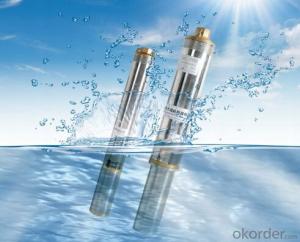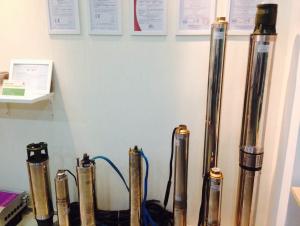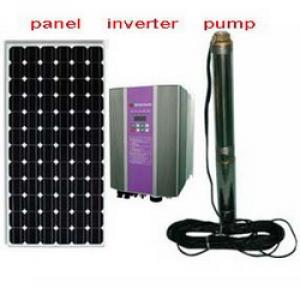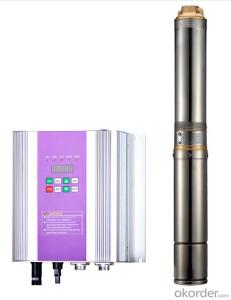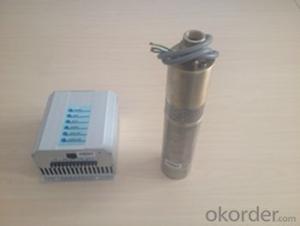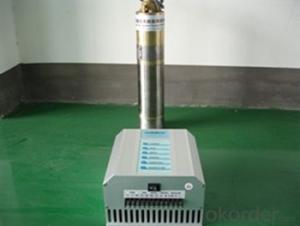Kusum Solar Pump - DC Solar Pumping Systems Popular Type Good Quality
- Loading Port:
- Shekou
- Payment Terms:
- TT OR LC
- Min Order Qty:
- 10 set
- Supply Capability:
- 6000000 set/month
OKorder Service Pledge
OKorder Financial Service
You Might Also Like
Products
DC Solar Pumping System can be applied to daily use (ground water), agricultural irrigation, forestry irrigation, desert control, pasture animal husbandry, water supply for islands, wastewater treatment engineering, and so on. Solar water pump System is dispensed with energy storing devices, and stores water instead of electricity. It improves the reliability of the device, at the same time, it lowers the construction and maintenance costs of the irrigation system dramatically.
In recent years, with the promotion of the utilization of new energy resources, Solar Pumping System is more and more used in municipal engineering, city centre squares, parks, tourist sites, resorts and hotels, the landscapes and fountain irrigation systems in the residential areas.
Technical Features
Optimization of Single Pump System
A single solar irrigation system consists of only one pump, a power -matched solar array and an inverter . The aim of optimization is to reduce the amount of PV modules as much as possible on the premise of filling the requirement of head and capacity. The rotational speed of pump is regulated according to the irradiation on the solar array; when the sunlight reaches its peak, the pump runs at the rated speed, and the output approaches the peak power of the solar array; when the sunlight is less abundant, the speed of pump varies bellow the range of the rated speed; when the speed as low as the capacity becomes zero, the solar pumping system stops working. So, there are big differences between solar irriation systems and traditional pumping systems in system design, and the system should be optimized according to the requirements of head, capacity, and local conditions of sunlight.
•Determine the optimal average daily operating time and the range of speed governing.
•Choose the optimal head and capacity of the pump.
•Determine the maximum power of PV modules, the best working voltage and method of connection.
Optimization of Multi-pump Systems:
There are several pumps in a multi-pump system. The pumps can be driven either by only one high-power inverter, or by several matching inverters. In the case of large capacity demand, the operation of the multi-pump system is more flexible. By switching solar arrays and pumps, all of the pumps run in MPPT mode when the sunlight is abundant, while some pumps will be shut down and all solar arrays supply power intensively for the rest running pumps when irradiation is weak. Based on the optimization of single pump system, the range of speed can be further optimized, and the photovoltaic(PV) pumping system always works with high efficiency.
Product Specifications
Model | Rated Power | Max. Flow | Max. Lift | Daily Water Supply | Outlet Dia. | Pump Dia. |
PSD600C | 600W | 4.5 m3/h | 30 m | 10 - 20 m3 | 1"1/4 | 4" |
PSD600H | 600W | 2 m3/h | 100 m | 5 - 10 m3 | 1"1/4 | 4" |
Solar Array Configuration
Max. Input Power | Max. Input Current | Max. Open Circuit Voltage | Recommended MPP Voltage |
1000W | 15A | 150VDC | 60 - 120VDC |
Recommended Design | Solar Panel | Connection | Total Power |
Configuration 1 | 190W / 35Vmp | 2 pcs x 2 strings | 760W |
Configuration 2 | 250W / 30Vmp | 3 pcs x 1 string | 750W |
Performance Curve
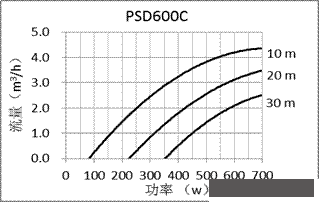
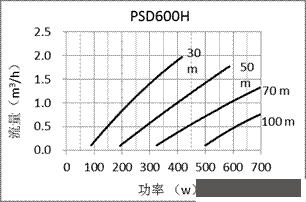
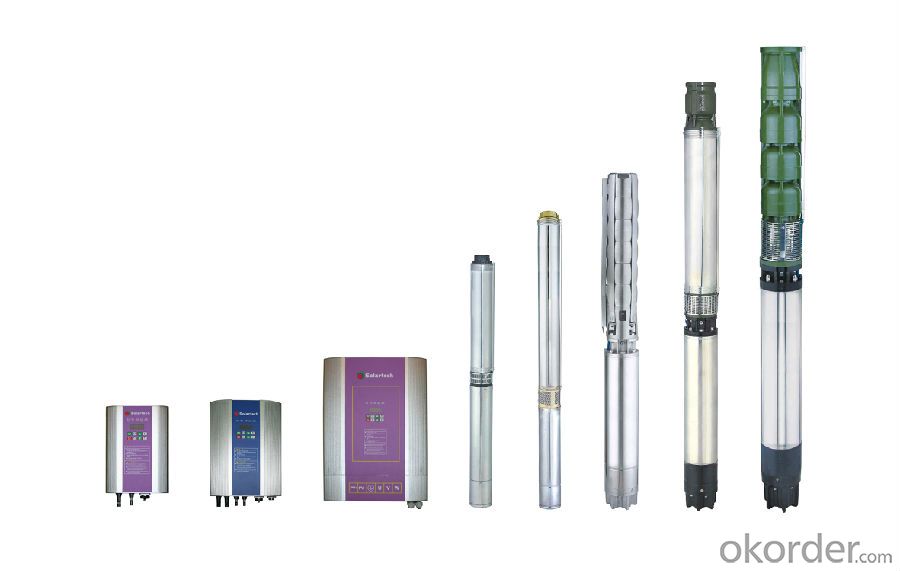
- Q: How do I choose the right size solar pump for my needs?
- Choosing the right size solar pump for your needs depends on several factors that you should consider. Here are some steps to help you make an informed decision: 1. Determine your water requirements: Start by assessing the amount of water you need the solar pump to deliver. Consider factors like the size of your water feature, the depth of the water source, and the flow rate required for your specific application. This will help you establish a baseline for the pump's capacity. 2. Evaluate the pump's flow rate: The flow rate of a solar pump is typically measured in gallons per hour (GPH) or liters per hour (LPH). Ensure that the pump you choose has a flow rate sufficient to meet your water requirements. It is better to select a pump that exceeds your needs slightly to account for any fluctuations or future expansion of your water feature. 3. Consider the lift height: The lift height, also known as the pump's head, refers to the vertical distance the pump needs to push the water. If your water source is located at a higher elevation or if you plan to pump water to a higher point, you will need a pump with a higher lift height capability. Ensure that the pump you choose can handle the height you require. 4. Assess the solar panel capacity: Solar pumps are powered by solar panels, so it is crucial to consider the capacity of the panels in relation to the pump's power requirements. Make sure the solar panels can generate enough electricity to run the pump efficiently. Consider factors like the pump's voltage, current requirements, and the solar panel's wattage and voltage output to ensure compatibility. 5. Take into account sunlight availability: The amount of sunlight your location receives is an important factor when choosing a solar pump. If you live in an area with limited sunlight, you may need a larger solar panel or a pump with a backup battery system to ensure continuous operation during cloudy days. 6. Read product specifications and reviews: Once you have narrowed down your options, carefully read the product specifications for each pump you are considering. Look for information on features, warranties, and customer reviews to ensure that the pump meets your specific needs and is reliable. By considering factors such as water requirements, flow rate, lift height, solar panel capacity, sunlight availability, and product specifications, you can choose the right size solar pump that will effectively meet your needs. It is always recommended to consult with a professional or a reputable supplier for guidance based on your specific circumstances.
- Q: Can solar pumps be used for water supply in disaster relief operations?
- Yes, solar pumps can be effectively used for water supply in disaster relief operations. They are a reliable and sustainable solution, particularly in areas where electricity is limited or unavailable due to the disruption caused by the disaster. Solar pumps can provide a continuous and efficient water supply, helping to meet the critical water needs of affected communities during emergency situations.
- Q: Can a solar pump be used for water supply in dairy farms?
- Yes, a solar pump can be used for water supply in dairy farms. Solar pumps utilize sunlight to generate power for pumping water, making them a sustainable and cost-effective solution for water supply in agricultural settings. They can effectively meet the water requirements of dairy farms, ensuring a reliable source of water for the animals and various farm operations. Additionally, solar pumps are environmentally friendly and can reduce dependence on traditional energy sources, making them a suitable choice for sustainable farming practices.
- Q: Can a solar pump be used for desalination processes?
- Yes, a solar pump can be used for desalination processes. Solar pumps can provide the necessary energy to power desalination systems, such as reverse osmosis, where seawater is converted into fresh water by removing salt and other impurities. The use of solar energy makes the process more sustainable and environmentally friendly.
- Q: How does a solar pump handle water with high levels of manganese?
- A solar pump handles water with high levels of manganese by employing a filtration system that effectively removes or reduces the presence of manganese particles. The pump's filtration mechanism, typically equipped with a combination of screens, cartridges, or other filtration media, traps the manganese particles as the water passes through, preventing them from entering the pump and causing damage. This ensures the efficient and safe functioning of the solar pump while providing access to clean and manganese-free water for various applications.
- Q: Can a solar pump be used in areas with limited water sources?
- Yes, a solar pump can be used in areas with limited water sources. Solar pumps are designed to operate with minimal access to electricity and are often used in remote areas where traditional power sources are unavailable. By harnessing solar energy, these pumps can draw water from underground sources such as wells, boreholes, or other limited water sources, providing a sustainable and reliable water supply solution.
- Q: Is it possible to use a solar pump in areas with high water tables?
- Yes, it is possible to use a solar pump in areas with high water tables. Solar pumps are capable of lifting water from deep underground, including areas with high water tables. These pumps use solar energy to power the motor and pump, eliminating the need for electricity or fossil fuels. They can be an efficient and sustainable solution for accessing water in areas with high water tables.
- Q: Are there any limitations to the flow rate of a solar pump?
- Yes, there are limitations to the flow rate of a solar pump. The flow rate of a solar pump is dependent on factors such as the size and capacity of the pump, the power output of the solar panel, the intensity of sunlight, and the depth and source of water. These factors can affect the efficiency of the pump and limit its maximum flow rate.
- Q: How does the presence of shading affect the performance of a solar pump system?
- The performance of a solar pump system can be greatly impacted by the presence of shading. Shading can be caused by nearby buildings, trees, or other obstructions that block sunlight from reaching the solar panels. When shading occurs, the solar panels are unable to capture as much sunlight, resulting in a decrease in energy production. This decrease in energy directly affects the performance of the solar pump system, which relies on solar energy to function. Shading can cause the pump to work less efficiently, leading to lower capacity or even complete shutdown. The reduced energy input can result in slower water flow rates, decreased pumping heights, and overall diminished performance. Additionally, shading can create an imbalance in the solar panel array. If only a portion of the panel is shaded, it can cause a significant drop in voltage and current output. This may cause the system's inverter to shut down or activate a protective mechanism to prevent damage. To counteract the negative effects of shading, various measures can be taken. One option is to optimize the system's design and placement to minimize shading. This may involve carefully selecting a suitable location for the solar panels and positioning them to receive maximum sunlight throughout the day. Another approach is to utilize advanced technologies like micro-inverters or power optimizers, which can mitigate the impact of shading on the overall system performance. These devices help regulate the voltage and current output from individual solar panels, enabling the system to operate more efficiently even under shaded conditions. Regular maintenance and cleaning of the solar panels are also important to ensure optimal performance. This involves removing any dirt or debris that may further reduce energy output. In conclusion, shading can have a significant impact on the performance of a solar pump system by limiting the amount of sunlight reaching the solar panels. However, with careful design, placement, and the use of advanced technologies, the negative effects of shading can be minimized, allowing the system to operate more effectively.
- Q: Are there any limitations on the temperature range that solar pumps can operate in?
- Yes, there are certain limitations on the temperature range in which solar pumps can operate. Solar pumps are designed to function optimally within a specific temperature range, typically between -40°C to 60°C (-40°F to 140°F). Extreme temperatures beyond this range can affect the performance and efficiency of the solar pump, potentially leading to reduced output or even damage to its components. Therefore, it is essential to consider the temperature range of the location before installing a solar pump to ensure its successful operation.
Send your message to us
Kusum Solar Pump - DC Solar Pumping Systems Popular Type Good Quality
- Loading Port:
- Shekou
- Payment Terms:
- TT OR LC
- Min Order Qty:
- 10 set
- Supply Capability:
- 6000000 set/month
OKorder Service Pledge
OKorder Financial Service
Similar products
Hot products
Hot Searches
Related keywords


















